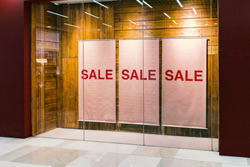by Jeff Grandfield and Dale Willerton
 It is much easier for customers to find your store if you have a prominent sign with your business name out front. The bigger the sign, the better – and the more attractive the sign, the better too. Don’t just assume, however, that your landlord shares your vision of a large sign identifying your business on or in front of his property.
It is much easier for customers to find your store if you have a prominent sign with your business name out front. The bigger the sign, the better – and the more attractive the sign, the better too. Don’t just assume, however, that your landlord shares your vision of a large sign identifying your business on or in front of his property.
Landlords impose signage criteria and restrictions mainly because whatever they allow one tenant to do signage-wise, the other tenants may also want to do. Most landlords prefer an uncluttered property without extra signage simply because it looks more attractive. If your landlord does allow you to place a sign on the property, creating and maintaining it is your responsibility. This extra work on your part, however, can be beneficial:
• Signage can make your business easier to find for customers who are specifically looking for you. If you’re located in an area with a sea of shopping plazas or office buildings, a sign with your name on it makes it much easier for customers to pick you out of the crowd.
• Signage can bring in customer traffic. Your sign may draw in customers looking to shop, but don’t know that you are there.
• Signage will become recognized by local residents who will see you as they commute to and from work daily. These residents are eventually more likely to visit your place of business because they are familiar with your name.
 With that being said, note that your landlord may allow certain types of signage and not others. Typically, the landlord requires either graphic drawings of your sign for written approval or provides you with a signage criteria package that you must follow as part of your lease agreement. Read this information carefully and understand that your landlord may consent to one type of signage but not another. To give you a better idea of what may or may not be allowed, here are the most common types of signage.
With that being said, note that your landlord may allow certain types of signage and not others. Typically, the landlord requires either graphic drawings of your sign for written approval or provides you with a signage criteria package that you must follow as part of your lease agreement. Read this information carefully and understand that your landlord may consent to one type of signage but not another. To give you a better idea of what may or may not be allowed, here are the most common types of signage.
Building: This is the signage that almost every in a retail location will have and it will generally appear directly above your main entry door. However, do not overlook the possibilities of having signage on multiple sides or even the rear of the commercial property if that will provide you additional exposure to walk-by or drive-by traffic.
Monument: A monument sign resembles a tombstone coming out of the ground and, typically, advertises just one or a few select tenants. Monument signs are not that common, but they can make your business look more substantial if you can get one.
Pylon: The tall sign by the roadway that tells passers-by what tenants are in the plaza is called the pylon sign. A property may have several pylon signs, which all display the name of the plaza at the top of the sign. Don’t just assume that you will automatically get a panel of the pylon sign. There are often more tenants in a property than sign panels available, so make this a part of your offer to lease or lease renewal. Ideally, try to pick your actual panel (both front and back), because a panel higher up on the pylon sign is usually more visible and read first.
Sandwich board signage and banners: These may be extremely useful for tenants offering a limited time special but landlords may say no. If these are of interest to you, negotiate for them in advance. Landlords may be more comfortable in knowing these signs will be out for specific promotions and not all year.
Temporary pull-away: These are the signs on wheels covered with images or business messages. Most landlords dislike these signs and the problems that they create. Again, negotiate pull-away signage rights up front, because the landlord doesn’t have to let you put these up if they are not included in the lease agreement.
 Dale Willerton and Jeff Grandfield – The Lease Coach are Commercial Lease Consultants who work exclusively for tenants. Dale and Jeff are professional speakers and co-authors of Negotiating Commercial Leases & Renewals FOR DUMMIES (Wiley, 2013). Got a leasing question? Need help with your new lease or renewal? Call 1-800-738-9202 or visit
Dale Willerton and Jeff Grandfield – The Lease Coach are Commercial Lease Consultants who work exclusively for tenants. Dale and Jeff are professional speakers and co-authors of Negotiating Commercial Leases & Renewals FOR DUMMIES (Wiley, 2013). Got a leasing question? Need help with your new lease or renewal? Call 1-800-738-9202 or visit